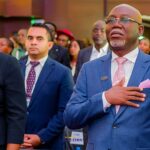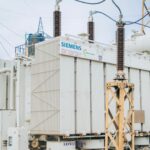…can NNPC deliver incremental growth we need on its own balance sheet?’- she queries
… Senegal, Libya, Ghana to Mozambique race for energy signals wake-up call for Nigeria
Oredola Adeola
Ms. Olubukola Verheijen, Special Adviser on Energy to President Bola Tinubu has challenged NNPC Exploration and Production Limited (NEPL) to prove it can drive the growth Nigeria needs alone, warning that if it cannot, the government must open doors to credible operators with the expertise, financial strength, and governance to get the job done.
She revealed this during her keynote address, delivered virtually at the opening of the 43rd NAPE Annual International Conference & Exhibition held at Eko Hotel, Lagos, on Monday.
“To act boldly and decisively, we must revitalize exploration and production in a way that delivers both energy security and sustainable development—not one at the expense of the other, but both together,” she said.
According to her, framing this mission can be captured in four simple words—the 4 Rs: Reserves, Revenues, Reliability, and Responsibility.
“These four pillars define our shared responsibility and will serve as the measure by which Nigerians, investors, and, most importantly, history will judge our efforts.
Emphasising the need to double reserve, she noted that the Nigerian National Petroleum Company Limited (NNPC) subsidiary, now a critical driver for growth, currently produces just 220,000 barrels per day—less than 10% of Nigeria’s national output.
The S.A on Energy to the President further questioned whether NEPL can fund and execute the drilling campaigns needed to double that figure, highlighting that, unlike the IOC-era onshore ventures, its joint venture partners can no longer carry NNPC.
“So, we must ask, ‘Can NNPC deliver the incremental growth we need on its own balance sheet?’.
“If not, we must have the courage to restructure asset ownership and invite those who can deliver, credible operators with the technical expertise, financial depth, and governance discipline,” she said.
Verheijen explained that revitalizing Nigeria’s petroleum sector requires performance-based stewardship, not sentiment.
Speaking on revenue, she emphasized the importance of translating policy into projects and projects into cash flows.
“Bankable molecules move faster, and capital flows where it is welcomed, protected, and multiplied.
“In Nigeria, policy is translated into projects, and projects into cash flows. In just 18 months, we have unlocked over $8 billion in final investment decisions, including key projects like Bonga North, Erha and others with a clear line of sight to another $20 billion.
“These are not just numbers; they represent signatures and investments being moved under the ground,” she said,
On the subject of reliability, the S.A on Energy stated that energy security is not a press release, but a promise kept.
“From 6 a.m., when a mother turns on her light, to 6 p.m., when commercial transport and businesses access electricity or affordable compressed natural gas (CNG), reliability touches the daily lives of Nigerians.
“Achieving this depends on securing feedstock through multi-year Gas Supply Agreements for LNG and domestic markets, enforcing approval discipline with deadlines and performance contracts, maintaining network integrity using advanced leak detection and rapid response mechanisms, ensuring power sector liquidity by resolving legacy debts and targeted subsidies, and promoting regional integration through deeper gas and power trade across West Africa,” she said.
She further noted that energy security, is one of eight priorities in the President’s renewable agenda, linking reliable power and fuel to improved lives, jobs, and social investments.
Speaking on responsibility, Verheijen recommends the need for sustainable operations and emissions reduction.
According to her, initiatives include flare-to-value programs, electrification, solarized flow stations, waste heat recovery, and renewable energy deployment behind the fence.
“Nigeria’s path is clear: we will remain a reliable oil supplier while becoming Africa’s leading gas hub for cleaner, flexible power.
“We are not choosing between development and decarbonization; we are achieving development through decarbonization,” she said.
She further noted that Senegal’s speed and clarity in turning discoveries into production, and Libya’s scale and stability in restoring investment and output are lesson for Nigeria.
She said, “Nigeria’s advantage lies in its market size, subsurface wealth, and human capital, paired with discipline, transparency, and execution.”
Tinubu’s Energy Adviser revealed the country’s plans to strengthen local content and skills development.
This according to her, involves focus on training geoscientists to become energy scientists fluent across oil, gas, carbon capture, utilization and storage (CCUS), and geothermal energy.
She said, “Vendor programs will prioritize delivery, safety, cost efficiency, and support for indigenous players through transparent partnerships.
The S.A on Energy emphasised that progress expected to be made over the next 12 months will be measurable through new exploration commitments and wells drilled, reserves added and tied into the system, gas supply agreements signed and delivered, improved product supply stability, reduced outages, and shorter cycles from concept to final investment decisions.
“Energy security is not just about electrons or molecules. It is about possibility, ensuring every Nigerian child can aspire to a brighter tomorrow, powered by the work we do today,” she said.
Verheijen said, “Since 2023, under President Tinubu’s leadership, Nigeria has focused on restoring clarity and confidence in its energy sector.
“The global energy landscape is evolving rapidly, with exciting developments emerging across Africa, from Ghana and Senegal joining the ranks of oil-producing nations, to Angola’s LNG ambitions, Mozambique’s major energy projects, and Namibia’s growing role in the sector.
“What does this mean for Nigeria? The world is not standing still, and countries will not wait for one another to catch up.
“For us, it means we must do more and move faster to attract exploration and production investment,” she noted.
According to her, investors are spoiled for choice, and their decisions depend on clear, hard-headed assessments of where capital can be deployed most efficiently and where the best returns can be achieved.
This, she said, is why the Nigerian government has prioritized reforms aimed at making the country a destination of choice for upstream investment.




